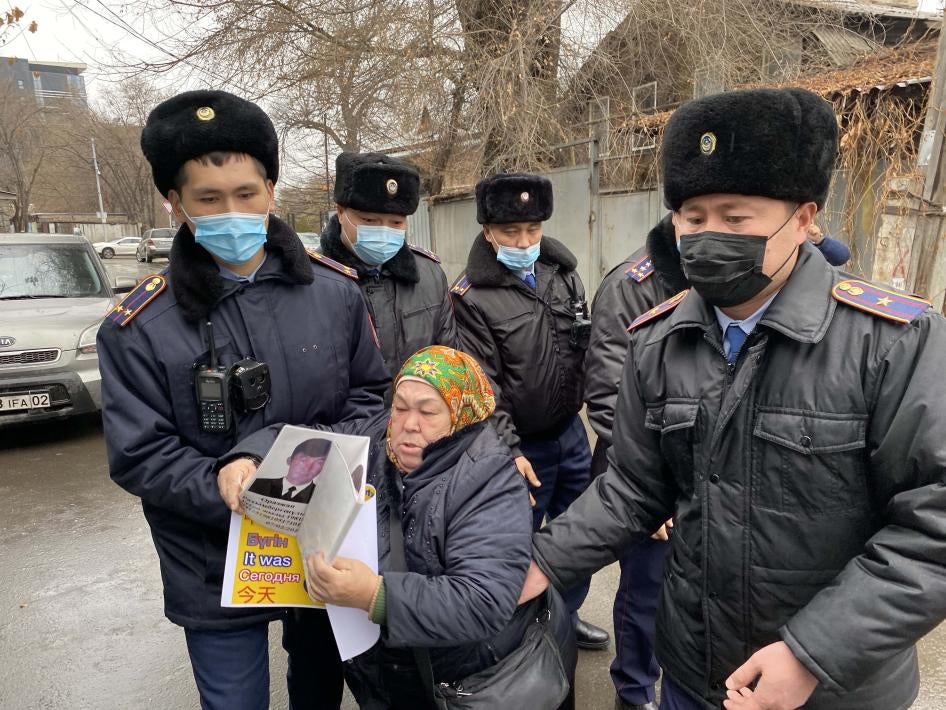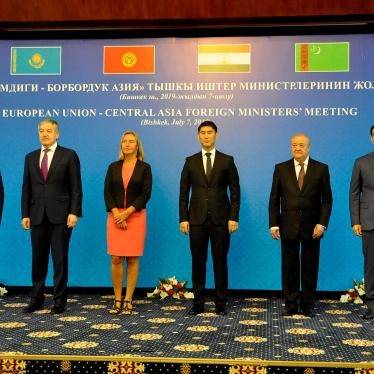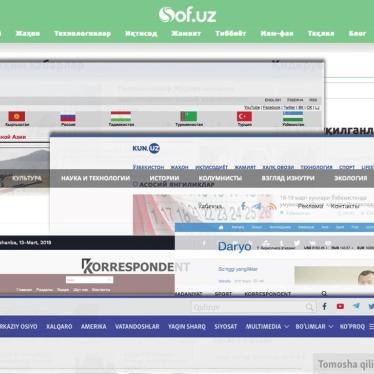(Berlin) – Kazakhstan authorities have failed to prioritize protecting human rights during the country’s current crisis, and should urgently cancel any order to shoot to kill without warning and uphold the rights of those in detention, Human Rights Watch said today in its World Report 2022.
More broadly, Central Asian countries neglected during 2021 to take meaningful action to address impunity for torture and domestic violence, suppression of free speech, and politically motivated prosecutions, which continued unabated or worsened across the region. Countries in the region played an important part in response to the crisis in Afghanistan, but problematically, mostly kept their borders closed to fleeing Afghans.
“With dozens, perhaps hundreds killed and thousands in detention, the human rights concerns over the crisis in Kazakhstan are acute and need to be urgently addressed,” said Hugh Williamson, Europe and Central Asia director at Human Rights Watch. “The global spotlight is on authorities in Kazakhstan to show that they respect people’s basic human rights. Kazakhstan should be transparent about the recent events, investigate abuses by government forces, and hold those responsible accountable.”
In the 752-page World Report 2022, its 32nd edition, Human Rights Watch reviews human rights practices in nearly 100 countries. Executive Director Kenneth Roth challenges the conventional wisdom that autocracy is ascendent. In country after country, large numbers of people have recently taken to the streets, even at the risk of being arrested or shot, showing that the appeal of democracy remains strong. Meanwhile, autocrats are finding it more difficult to manipulate elections in their favor. Still, he says, democratic leaders must do a better job of meeting national and global challenges and of making sure that democracy delivers on its promised dividends.
The pace of human rights reforms stalled in the lead-up to October presidential elections in Uzbekistan, with clear setbacks in media and speech freedoms, repeated registration denial for independent human rights groups, and criminal investigations targeting outspoken bloggers. In May, Otabek Sattoriy, a blogger, was sentenced to six-and-a-half years in prison on dubious slander and extortion charges. No genuine opposition candidates were allowed to run in the election, which the incumbent President Shavkat Mirziyoyev won with 80.1 percent of the vote. Although Uzbekistan contributed to the evacuation effort in neighboring Afghanistan, it closed its land border, hindering efforts to provide international protection to at-risk Afghans fleeing the country.
Turkmenistan’s abysmal human rights record deteriorated further in 2021. The Turkmen government failed to ensure an adequate standard of living and the right to food for economically vulnerable households, while denying that people are living in poverty and mishandling the economic and food crises. The authorities targeted Turkmen nationals living abroad who are critical of government policies, and imprisoned perceived critics and independent correspondents at home. The government continues to deny that the country has had any Covid-19 cases, while the authorities have threatened and jailed people for openly demanding access to information about the virus.
The authorities in Tajikistan harassed and imprisoned government critics, including members of the banned opposition Islamic Renaissance Party of Tajikistan. Izzat Amon, a Moscow-based lawyer who was helping migrants and who was critical of the government, was forcibly disappeared and unlawfully transferred to Tajikistan in March. Tajik security officers intimidated journalists and civil society activists. In April, the Tajik military engaged in a two-day border conflict with Kyrgyzstan that left over 40 civilians dead.
Kyrgyzstan adopted a new constitution that includes several provisions undermining human rights norms, and initiated a massive legal review that was rushed and failed to involve a proper consultation process. The country’s caretaker parliament adopted several problematic bills, one imposing unnecessary financial reporting requirements on nongovernmental organizations, and another penalizing “false” information. The authorities have reopened an investigation into the death in custody of the human rights defender Azimjon Askarov after demands for justice from civil society. Kyrgyzstan, similar to Tajikistan, has failed to investigate possible abuses by its military in the border conflict in April.
In Kazakhstan, the protests and violence in early January 2022 raise pressing human rights concerns that have their roots in events in 2021 and earlier years. During 2021the authorities cracked down on government critics using overbroad “extremism” charges, imprisoning over half a dozen on politically motivated charges, while continuing to restrict the right to peaceful protest. The authorities suppressed free speech and under the guise of protecting children, are considering legal amendments that would further threaten access to information and free speech. Parliament scrapped a review of a new domestic violence law, but did not propose any meaningful alternative. Industrial action by workers noticeably increased in 2021, even as the International Labor Organization in June delivered its most critical review of Kazakhstan’s labor rights record yet.
“Central Asia is likely in 2022 to stay in the international spotlight with the focus on the crisis in Kazakhstan, on Afghanistan, and on regional security issues,” Williamson said. “Ensuring stability in the region also requires respect for human rights and the rule of law. This year is an opportunity for Central Asian leaders to make this connection and act on it.”









